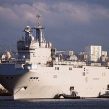
Russia and France Create Naval Construction Entity Ahead of Mistral Tender
Publication: Eurasia Daily Monitor Volume: 7 Issue: 199
By:

The ill-omens continue accumulating for NATO in the run-up the Alliance’s summit. Among the adverse trends (which NATO and the United States are unwilling to discuss) is the temptation of some West European governments and arms producers to sell modern military equipment to Russia. This trend is gathering strength while inter-allied coordination is lacking, and the consequences of strengthening Russian power in Europe remain unanalyzed. Conducting such an analysis, or creating a Cocom-type body at NATO, risk being deemed politically incorrect ideas at this time in Washington and Brussels.
In an October 27 Russian media interview, US Assistant Secretary of State, Philip Gordon, declared that France, “as an ally of the United States in NATO,” has the right as a matter of national sovereignty to sell Mistral-class warships to Russia, even if “the United States might have a different opinion.” The US only expects NATO allies to act with “self-restraint” when selling arms that “could significantly change the military balance in hypothetically unstable regions” (www.gazeta.ru cited by Interfax, October 27). The statement implies a US green light to the sale of Mistral power-projection ships to Russia, apparently reversing objections expressed earlier (if only sporadically) by Defense Secretary, Robert Gates, and Deputy Secretary of State, James Steinberg. Since then, Russian government and military leaders have made clear that Moscow alone would decide where to deploy these warships, once they are delivered.
On November 1 in St. Petersburg, Russia’s United Shipbuilding Corporation (OSK) and the French shipbuilder DCNS (Direction des Constructions Navales, Systemes et Services) signed an agreement to create a consortium for building warships and civilian ships. The CEO’s, Roman Trotsenko and Patrick Boissier, signed the agreement in the presence of Russian Deputy Prime Minister and OSK board chairman, Igor Sechin, and French General Benoit Puga, head of President Nicolas Sarkozy’s military staff.
The consortium’s declared goal is participation in shipbuilding tenders to be announced by the Russian government. DCNS and OSK will create a joint venture for each shipbuilding project, with the shareholders’ structure to be determined on a case-by-case basis. The Mistral project is not specifically mentioned in the agreement’s published summary, but is clearly implied. DCNS shipyards (Lorient, Toulon, Brest) account for slightly more than half the value of Mistral-class warship construction in France. OSK is the designated Russian builder of the third and fourth Mistral-class warships, if France delivers the first two ships. DCNS stakeholders are the French state with 75 percent and the French Thales high-technology group with 25 percent (Agence France Presse, Interfax, November 1).
The Russian government had earlier indicated a preference for the other major French shipbuilder, STX France (formerly Chantiers de l’Atlantique), as partner in the Mistral project. STX accounts for slightly less than half the value of Mistral-class ship construction. In July, President Sarkozy pledged that the Mistral project with Russia would rescue the crisis-stricken Saint-Nazaire, the main STX shipyard. Speaking at the naval construction exhibition, Euronaval-2010, at Le Bourget in late October, STX CEO, Jacques Hardelay, confirmed that the STX shipyards, Nantes and Saint-Lazare, are ready to start building the first two Mistral-class ships for Russia, and transfer the technology to Russia for construction of two more ships there. STX France stakeholders are the French state with 33.34 percent, the French Alstom high-technology group with 16 percent, and the South Korean-Norwegian STX Europe with 50.66 percent (RIA Novosti, November 1).
The Russian government announced in August that it would call an international tender for Russian purchase of Mistral-analogue warships and subsequent construction of such ships in Russia under license. During October the government claimed that Dutch and Spanish shipyards (which have built the Mistral-analogue Johan de Wit and Juan Carlos ships, respectively, for their national forces) had agreed to participate in the competitive tender, alongside Russian shipyards. At the Euronaval exhibition just held, the Italian shipyard Fincantieri also offered to enter the contest with the ship of its design. Moscow expects the competitive offers to come in by late November (Interfax, RIA Novosti, October 26, 27).
This tender hardly looks genuine. It seems calculated, first, to mask the preference already given to France. Second, it seeks to pressure France into lowering the sale price on the first two ships, facilitate the Russian purchase with French credits, and transfer high technologies to Russia. Third, the tender seeks to compel France (and the other West European participants) to team up with Russian shipyards for building the third and fourth ships, as a precondition to any deal. Fourth, it seeks to create multiple options for Russia in the event that other offers turn out to be more advantageous that the French offer. Fifth and perhaps most importantly, Russia seeks to involve the maximum possible number of West European government-supported companies in this tender, so as to legitimize arms sales to Russia and preclude a debate in NATO. Even if France wins the tender, as seems likely, massive European participation will indicate that selling offensive weapons systems to Russia has gained general acceptance. The precedent will be set for NATO allies to compete against each other for modernizing Russia’s forces.




